Meet the women of Dalal Street
Despite challenges of culture and access to capital, female participation in trading and investing is increasing albeit cautiously, and they are vying to be taken seriously


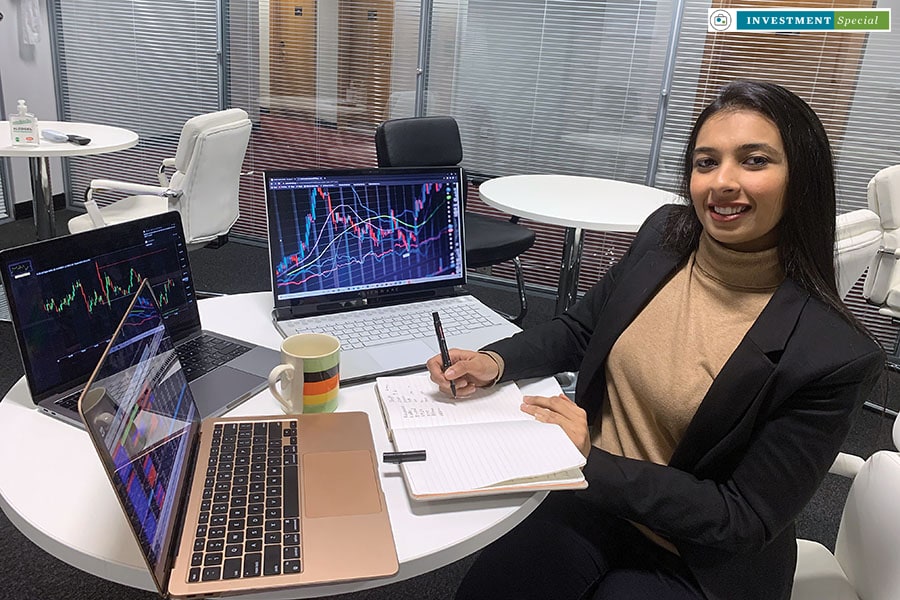 Mahek Shah
Mahek Shah
Do you even know what volumes mean in the stock market?” Mahek Shah was asked this question in 2017. She had just started trading a year earlier, as a 19-year-old, and was asked this question by a man who found it difficult to take her, or women in general, seriously when it came to trading on Dalal Street. But Shah let her work speak for itself.
Intrigued by the stock market, Shah first tried her hand at intraday trading in 2016 while she was still in college, armed with savings of Rs 20,000. She was fascinated by the thrill of it all: The dynamic price movements right in front of her eyes, the constant tracking and monitoring of stocks, the determination to understand technical terms, and the rush of earning good profits when she made the right decisions. Shah gradually started trading with Rs 1 lakh or Rs 2 lakh, and the highest profit she has made in a day’s trade went as high as Rs 77,000. She started day trading full-time after graduating in 2018, her eyes glued to her laptop screen between 9 am and 4 pm, five days a week.
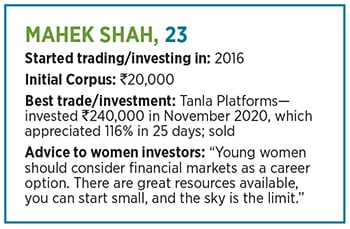
There were losses too: Three months into her trading in 2016, Mumbai-based Shah lost Rs 10,000, while trading with a capital of Rs 40,000. Later, she lost Rs 40,000 while taking up multiple trades to cover up for the loss made in one trade on a single day. “That disheartened me, but I decided to learn from my mistakes. That way, no day will be wasted and eventually, my money will grow,” she says. Shah learnt how to be more cautious, how to implement stop-loss limits to trades every day, how to be calm and focussed even when the markets are volatile, and how to tirelessly keep learning.
Shah is now pursuing a postgraduate degree in finance and investment banking in the UK. Even after a 25 percent scholarship, the tuition fee came to Rs 12 lakh, half of which she paid from the profits she made as a day trader. The rest was sponsored by her family, which she intends to repay soon. She has just moved to the UK for her year-long course, but has no intention of quitting intraday trading. “Once a stock trader, always a stock trader. I want to trade in the foreign market here by putting into practice what I’ve learnt in India,” says Shah, 23. “I have seen the power of trading and value investing now, and I know that if done correctly, it can give you high profits and quick financial independence in a couple of years.”
Pandemic Push?
The stock market, with all its number-crunching, technicalities, risk and volatility, has traditionally been a male domain. It continues to be largely so, but more women in the country are gradually participating in trading and investing, particularly in equity, with the upsides being money, financial independence and a flexible career. The widening reach of the internet, the freedom to work remotely, low initial investments, access to training resources and inspiration from other successful women are encouraging them to take this up.
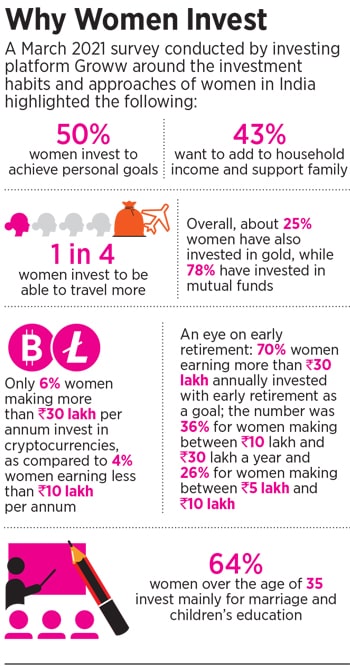
The number of women on brokerage firm Zerodha’s online trading platform, for instance, has increased to 7.2 lakh, up from 3.5 lakh last year, and they form 16 percent of the total traders on the platform. The average age is 30, says co-founder Nikhil Kamath, and the average ticket size women invest is about Rs 80,000. “A lot of them have bought into the corrections that the pandemic got with it. Hopefully, this is a precursor of increased participation and more women coming on board,” he says.
A survey conducted by online investment platform Groww among 28,000 women investors in March indicated that more of them are emerging as primary decision-makers for their wealth, as opposed to turning to the men in their family. In the 18 to 25 age group, almost 60 percent women say they take their own financial decisions.
Close to 10 percent of Groww’s one crore-odd customers are women. “We have seen a significant growth in the number of women investors on our platform in the past year compared to previous years,” says Lalit Keshre, co-founder, Groww. “The pandemic-induced lockdowns and work-from-home conditions have given them more time to research about investing in stocks and mutual funds,” he says. According to a September 2020 report in The Hindu, stock broking fintech startup Fyers acquired 20,000 new customers between last May and September, 10 percent of whom were women. Overall, women form around 15 to 20 percent of the platform’s customer base. Lxme, a financial platform dedicated to women, conducted several bootcamps to improve financial literacy last year, which saw participation from over 25,000 women. The transaction platform was launched in 2018, an online community in 2020, and currently, Lxme has over 15,000 women investors. The 6,400-odd women on its members-only Facebook page will be onboarded on the app by April. “Women make great investors. They understand what they are investing for, they are disciplined and not fickle-minded, and constantly commit more money over time, depending on their financial goals,” says Priti Rathi Gupta, founder of Lxme, a venture seed-funded by Anand Rathi Financial Services.
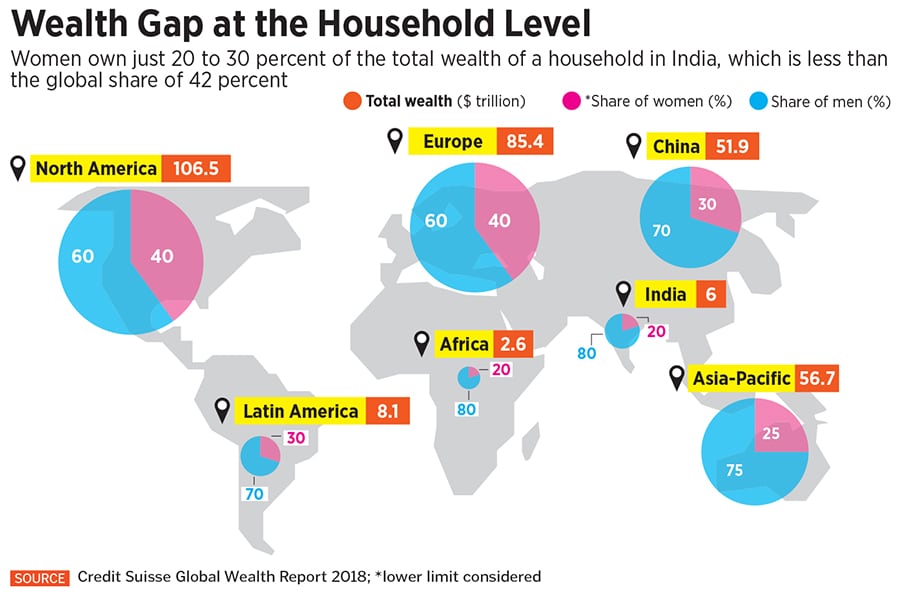
Gupta believes women are increasing their participation despite market conventions being stacked against them. “First, manufacturers and distributors of financial products have a ‘communication by men, for men’ approach, reinforcing that men take charge of money better,” she explains. Second, markets are often projected as a zero-sum game. “From The Wolf of Wall Street to Scam 1992, the narrative is that either you make vulgar amounts of money, or you lose it all. Women, being cautious investors, want to protect what they have instead of taking huge amounts of risk. So they are put off by the perception that they should enter the markets only if they are willing to lose all their money.”
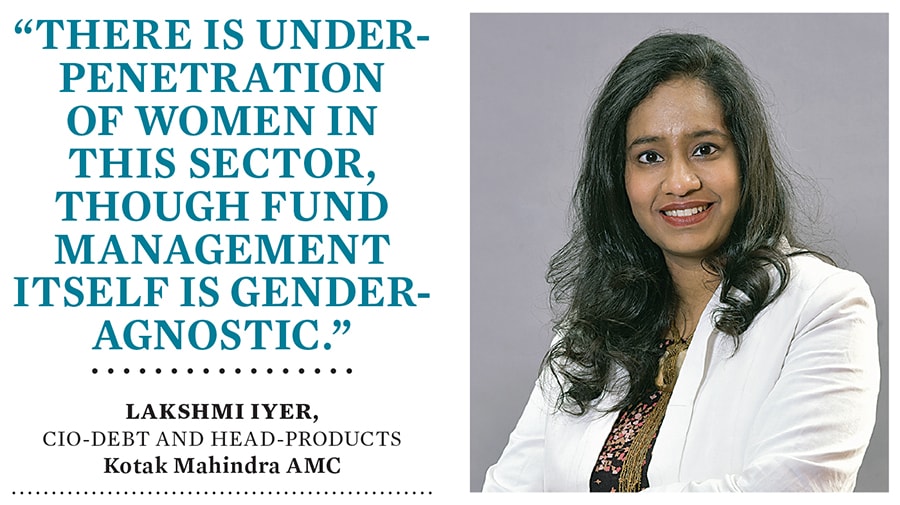
Third, she adds, while men build trust by way of immediate transactions, women try to discover products and instruments—particularly big-ticket purchases—by reading, talking to people and taking advice from experts and the community. “That’s a long journey. Typically, a financial firm does not have the patience for that,” Gupta says.
Most of the previous generation stuck to investment options like fixed deposits or gold, thus nurturing the mindset that markets are not for everyone. “We do what our parents do. So either many women do not have the time or inclination to get into trading, or many of them still turn to the men of their family to make financial decisions for them,” says Apeksha, 35, who mainly does intraday trading, apart from positional index and stocks trading.
She started trading three years ago without a mentor, poring through books, online resources and social media, where she found other helpful traders who introduced her to different trading methods and strategies like technical analysis, market profile, options trading etc. “You just have to keep trading, test what you’re reading, and implement it in live markets,” says Apeksha, who primarily follows the Nifty index for intraday trades. She believes she’s just a beginner who has not seen her share of bull and bear runs, and has not experienced “life-changing” profits or losses so far.
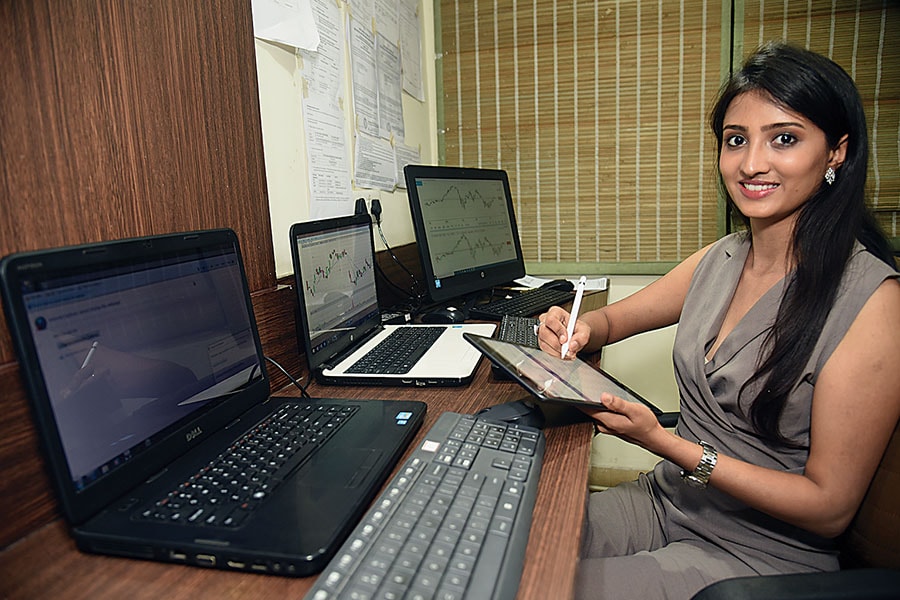
Priyal Anil Bagri. Photo by Rajesh Bansod for Forbes India
The Mumbai resident says anyone who is serious about trading has a journey where they go from big losses to small losses to break evens to small profits and finally big profits. But they have to be willing to put in the hard work. “Even today, people keep asking me what to buy. Or they are just trying to pick up tips from brokers, the media or others, without really putting the effort to read and research stocks,” she says. “You have so many options today, and many of them are free. But you have to be willing to put in the time. You cannot survive only on tips from others.”
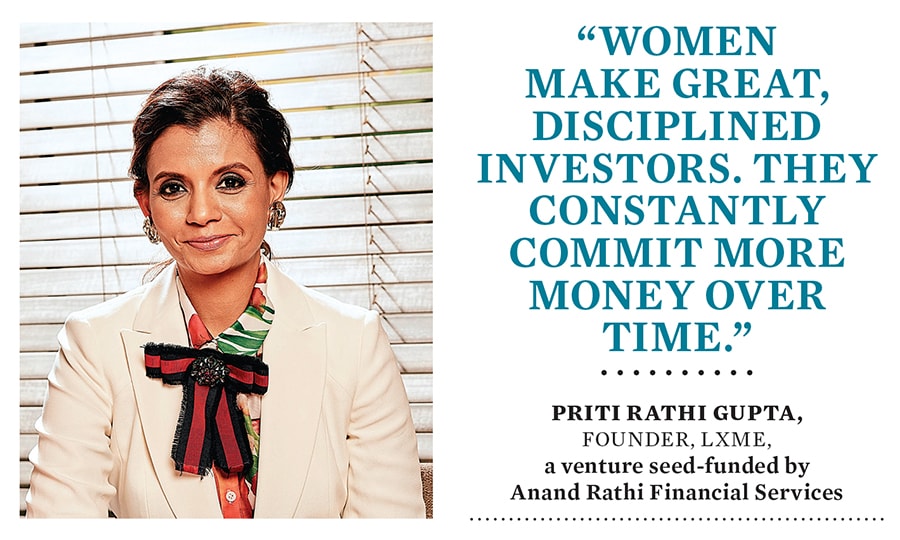
She believes women can become successful traders or investors only once they intrinsically feel the need to take control of their own money. Priyal Anil Bagri, 25, agrees. According to her, coming up with one good investment idea every 12 months is more rewarding than coming up with 12 trading bets in one day. Bagri dropped out of chartered accountancy training in 2016 to pursue equity investing. She swears by three rules for thriving in the stock market: Analysing the intrinsic value of only businesses she can understand, being agile in the market by taking losses on her chin and constantly learning, and chasing an aim to compound and double her wealth every three years.Bagri started off with a Rs 60 lakh initial capital from her father. She claims she doubled the amount in 30 days, but just when she started thinking she had understood the ways of the stock market like the back of her hand, she faced a Rs 11 lakh loss in a single day, and then another one, followed by one more, until her entire earnings were close to being wiped off. The loss shocked her, she says, but she wanted to succeed in investing so badly that she did not give up.
Her aim was to create wealth, and not just make money, for which she had to be patient, she adds. “The biggest challenge is to balance your greed and fear. But I think no other profession can give you these kind of returns, so I decided to increase my threshold of pain and keep learning in the markets,” says Bagri, who has founded Nathibai Tulsidas Investments in Nagpur and is also working on building a tech startup.
Good for markets and GDP
Even though losses are an inevitable part of the trading and investing game, women tend to face harsher repercussions than men due to long-standing prejudices, say experts, which adds to their cautious and fearful attitude toward the markets. “Even today, if a man loses money, it’s fine. But if a woman loses money, everyone says, ‘Oh, I told you so. You can’t handle it’. These unconscious biases are reinforced time and again, and women are reprimanded more than men for making the same mistakes,” says Mrin Agarwal, founder director of finance education platform Finsafe. “Lack of knowledge and confidence are also not helpful.”
Another factor that does not help is that women are underrepresented on the other side of the spectrum too: As fund managers. The Groww survey quoted earlier states that 78 percent of women invested in mutual funds, making it their most preferred asset class. However, only 30 of the 378 fund managers in India are women, according to a Morningstar report released in March.
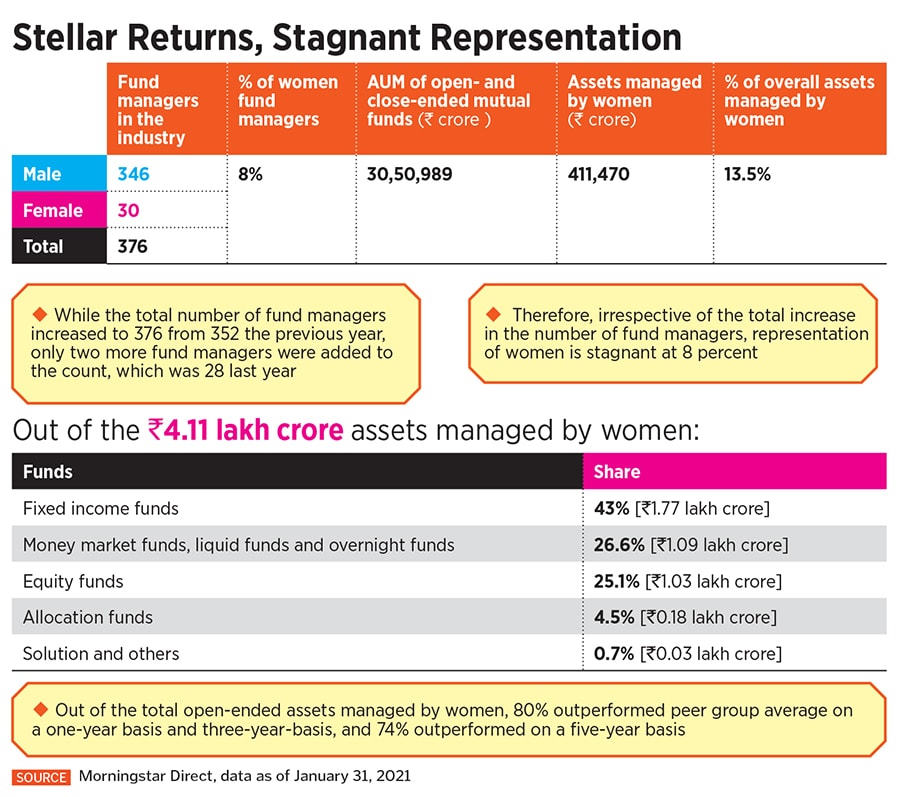
India has added just two women fund managers since last year, as opposed to 26 men. Out of the approximately Rs 30.5 lakh crore assets being managed as of January, women manage 13.5 percent. Out of the total open-ended assets under management (AUM) by women fund managers, 80 percent of the AUM outperformed the peer group on a one-year and three-year basis, and 74 percent of the AUM outperformed on a five-year basis—“a feat truly worth commending”, the report notes.
“There is under-penetration of women in this sector, though fund management itself is gender-agnostic,” says Lakshmi Iyer, chief investment officer, debt, and head-products at Kotak Asset Management Company. According to her, the sector is structured in a manner that makes it easier for women to enter.
“There are niche specialisations within fund management and the definition of wealth itself has evolved. Work hours have become more flexible compared to what they were when I entered the industry around two decades ago, and many entry barriers have been eliminated. So the biggest impediment, I think, is one’s own mental block,” Iyer says, adding that formal mentoring while starting out will always help. “Fund managers are easily accessible on formal platforms like LinkedIn, while getting quick information via social media also helps. All these platforms create scope for formal mentoring and streamline access to information. One just has to grab these resources with both hands.” Gupta of Lxme believes that if half the country’s population is left out of the financial markets, the disparity in wealth-creation will only grow wider, and worsen the existing income disparity between men and women. Kamath of Zerodha, agrees. According to him, only 1 to 1.5 percent of the country’s population has access to financial markets, which is “abysmally low”.
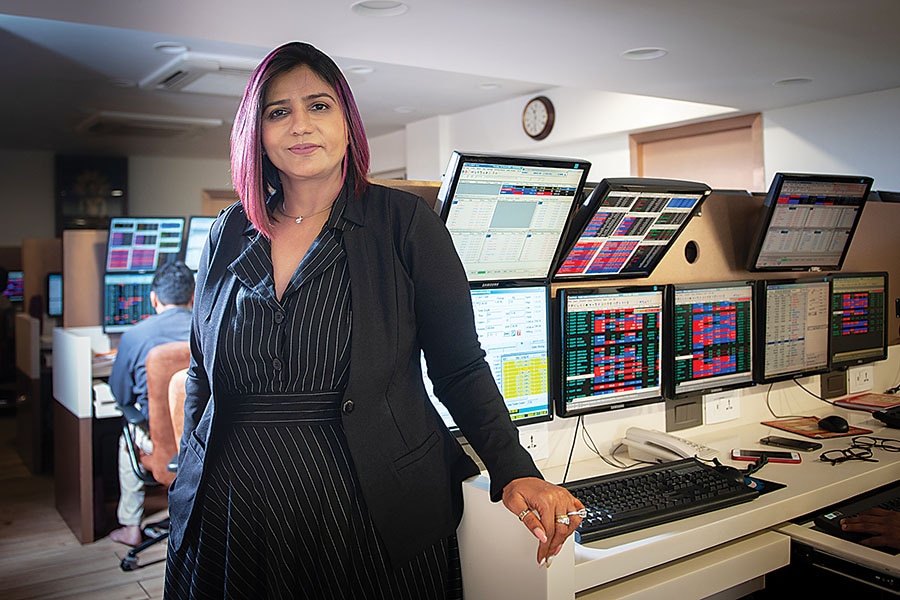
Avni Paresh Shah. Photo by Neha Mithbawkar for Forbes India
A crucial part of improving this statistic is to improve the number of women who trade and invest, he adds. Kamath explains that even though the number of women traders on Zerodha has doubled in absolute numbers over the past year, their proportion to total investors on the platform has remained stagnant at 16 percent. “So for every 100 people who are investing and trading, only 16 of them are women and 84 are men. This gender ratio itself is not changing,” he says.
Kamath points out how women account for only 19 percent of the workforce in India. “We have to match countries like China and Bangladesh when it comes to female workforce participation, particularly if we have to achieve the $5 trillion Gross Domestic Product target or progress as a country,” he says. “Only once you reduce the gender pay gap by bringing more women into the workforce can you improve women’s access to capital, which will in turn expand their investible surplus and enable better participation in the financial markets.”
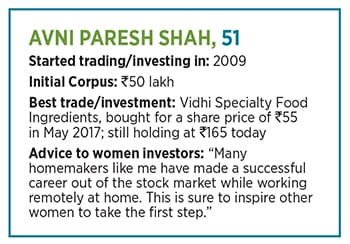
It is important for men to enable women to participate more in equity markets, says Avni Paresh Shah, promoter of Mansi Share and Stock Advisors, which deals in shares and securities, investment advisory and equity broking. Shah made a full-time career on Dalal Street, with the help of her husband after being a homemaker until a little after the turn of the century. She now manages financial assets with a net worth of about Rs 20 crore.
“Women, by virtue of running homes, are naturally good at handling money, and this is a business that offers flexibility to earn money with just a laptop and a demat account. You can start with a low investment too,” Shah says. “I know many homemakers like me who have made a successful career out of the stock market while working remotely at home, and this is sure to inspire other women to take the first step.”
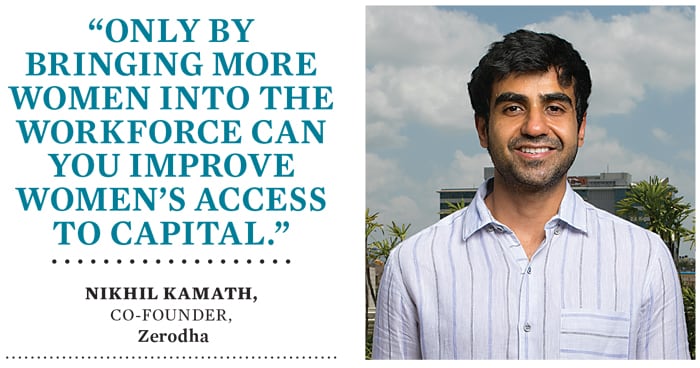
Apeksha says it is also fine to second-guess yourself every morning, with every trade. “You will keep making mistakes and losses, which will get lesser with time. But until then, you need to be cautious while having confidence in yourself. Just let the markets teach you.”
First Published: Apr 06, 2021, 14:26
Subscribe Now